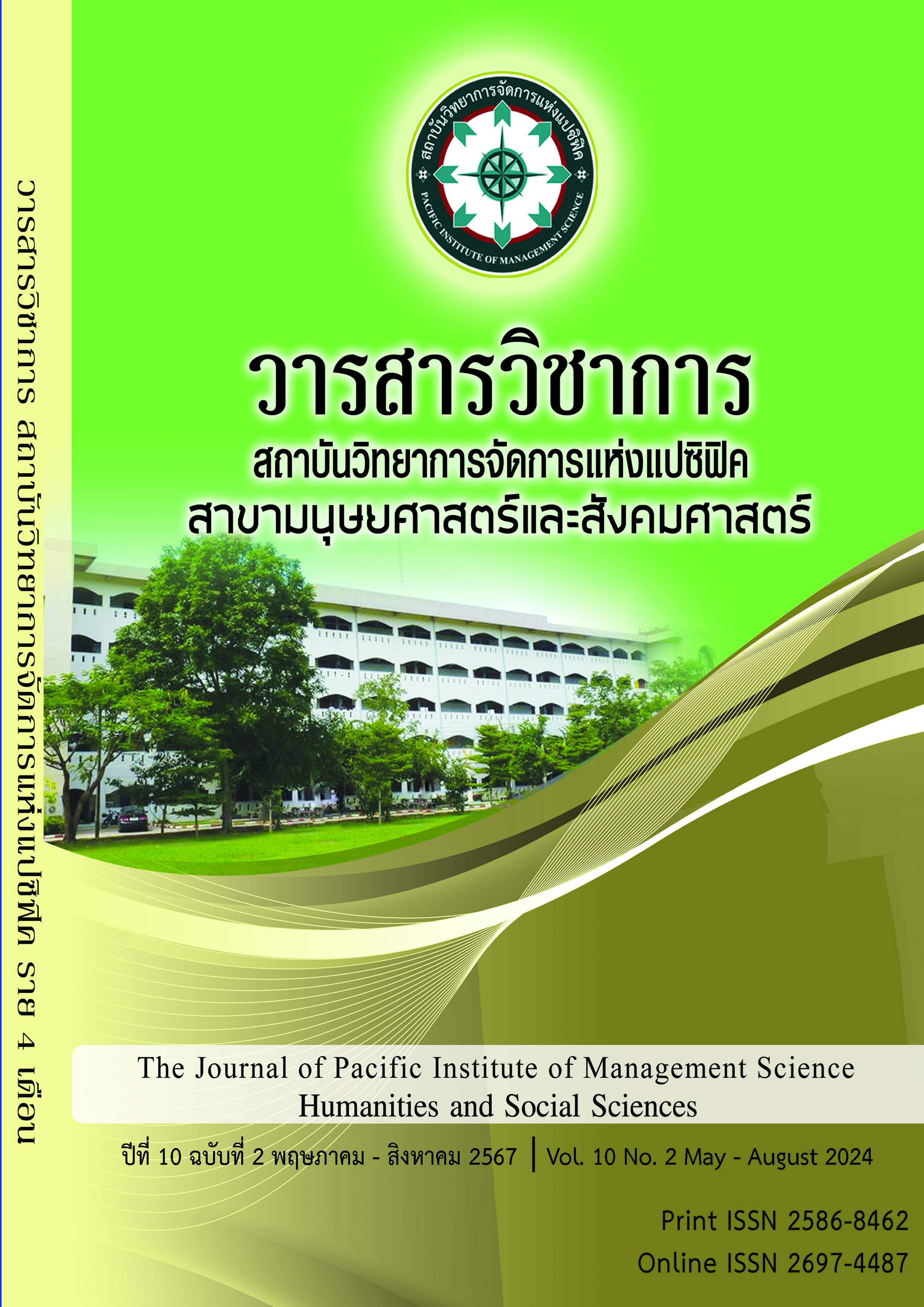Factors Influencing Customers’ Loyalty of Molding and Metal Forming Industry
-
Keywords:
Factors influencing loyalty, customers, molding industry, metal forming industry.Abstract
The research objectives were as follows: 1. to study the personal factors, the service quality factors, the relationship quality factors, the factors within the purchasing process and corporate brand value factors influencing customer loyalty in the molding and metal forming industry; 2. to identify various factors influencing customer loyalty in the molding and metal forming industry.The research population consisted of employees from companies and industrial plants, including both current and potential customers in the metal stamping and molding business. While the precise number remains unknown, a sample size of 385 samples was calculated using the Cochran sample size formula.
The research findings revealed the following: 1. Personal factors, such as position, division/department, type of factory, and registered capital of the respondents, considered overall and each aspect, significantly influenced customers' loyalty behavior, especially the position of employees. 2. Service quality factors significantly affected customer loyalty in the molding and metal forming industry in terms of attitude and behavior at a significanof 0.05. 3. Relationship quality factors significantly impacted customer loyalty in the molding and metal forming industry in behavioral aspects at a significance level of 0.05. 4. Purchasing process factors had a significant effect on customer loyalty in the molding and metal forming industry in the behavioral aspect, with a significance level of 0.05. 5. Organizational brand value factors affected customer loyalty in the molding and metal forming industry, in the attitude aspect, with a significance level of 0.05. 6. Service quality, relationship quality, purchasing process, and organizational brand value factors collectively influenced customer loyalty in the molding and metal forming industry, in terms of attitude, at a significance level of 0.05.
References
กรมโรงงานอุตสาหกรรม (2566). [ออนไลน์]. สืบค้นเมื่อ 1 พฤษภาคม 2566 จาก
https://www.diw.go.th/webdiw/.
กฤชณัท แสนทวี. (2560). อิทธิพลของชื่อเสียงองค์กรต่อความภักดีในแบรนด์. วารสารมหาวิทยาลัยนครพนม.
(2), 81-89.
ไกรกฤตย์ บุษบรรณ และสมบูรณ์ สารพัด. (2564). อิทธิพลของปัจจัยคุณภาพการบริการต่อความภักดีของ
ลูกค้าในอุตสาหกรรมผลิตชิ้นส่วนยานยนต์ในนิคมอุตสาหกรรมอีสเทิร์นซีบอร์ด จังหวัดระยอง. Journal of Roi Kaensarn Academi. 6(10), 255-270.
ชุติเดช ทั่นคงธรรม และคณะ. (2559). ปัจจัยที่มีผลต่อความสำเร็จในการจัดการธุรกิจโรงงานเกี่ยวกับ
อุตสาหกรรมยานยนต์ในเขตนิคมอุตสาหกรรมภาคตะวันออก. วารสารศึกษาศาสตร์ปริทัศน์. 32(2), 24-30.
ณัฏม์ฐิญา มโนขัต. (2558). ปัจจัยที่มีความสัมพันธ์กับพฤติกรรมการซื้ออุปกรณ์ประดับยนต์ของลูกค้าจากร้าน
ประดับยนต์ในจังหวัดนนทบุรี. วารสารวิชาการมหาวิทยาลัยธนบุรี. 7(14), 63-72.
มณฑิรา ศรีด้วง,ณัฏฐ์ชุดา วิจิตรจามรี. (2559). ความพึงพอใจและความภักดีต่อตราสินค้าของศูนย์บริการตอบ
รับทางโทรศัพท์ในอุตสาหกรรมสินเชื่อรถยนต์ของผู้บริโภคในกรุงเทพมหานคร. งานประชุมทางวิชาการครั้งที่ 53 มหาวิทยาลัยเกษตรศาสตร์ 3 - 6 กุมภาพันธ์ 2558, กรุงเทพฯ, ประเทศไทย.
วราพร ดำรงกูลสมบัติ,สุดาวรรณ สมใจ และนัยนา เกิดวิชัย. (2563). บุพปัจจัยของความภักดีของลูกค้าในอตุสา
หกรรมเหล็กกล้าไร้สนิมในพื้นที่ระเบียงเขตเศรษฐกิจภาคตะวันออก. วารสารมหาจุฬานาคทรรศน์. 6(10), 5529-5539.
อนัญญา อุทัยปรีดา. (2556). ความเชื่อมั่นในตราสินค้าและภาพลักษณ์ประเทศแหล่งกำเนิดสินค้าที่ส่งผลต่อ
การตัดสินใจซื้อ. การค้นคว้าอิสระ, หลักสูตรบริหารธุรกิจมหาบัณฑิต บัณฑิตวิทยาลัย, มหาวิทยาลัยกรุงเทพ.
อิศเรศ แสงนนท์. (2560). ปัจจัยที่มีผลต่อการตัดสินใจซื้อยี่ห้อเครื่องมือตัดของโรงงานอุตสาหกรรมผู้ผลิต
ชิ้นส่วนยานยนต์ในนิคมอุตสาหกรรมภาคตะวันออกของประเทศไทย. การค้นคว้าอิสระ, หลักสูตรบริหารธุรกิจมหาบัณฑิต คณะบริหารธุรกิจ, มหาวิทยาลัยเทคโนโลยีราชมงคลธัญบุรี.
Parasuraman, Zeithaml & Berry. (1996). The Behavioral Consequences of Service Quality.
Journal of Marketing. (60), 31-46.
Downloads
Published
Issue
Section
License
Copyright (c) 2024 Pacific Institute of Management Science

This work is licensed under a Creative Commons Attribution-NonCommercial-NoDerivatives 4.0 International License.
บทความที่ได้รับการตีพิมพ์เป็นลิขสิทธิ์ของ สถาบันวิทยาการจัดการแห่งแปซิฟิค
ข้อความที่ปรากฏในบทความแต่ละเรื่องในวารสารวิชาการเล่มนี้เป็นความคิดเห็นส่วนตัวของผู้เขียนแต่ละท่านไม่เกี่ยวข้องกับสถาบันวิทยาการจัดการแห่งแปซิฟิค และคณาจารย์ท่านอื่นๆในสถาบันฯ แต่อย่างใด ความรับผิดชอบองค์ประกอบทั้งหมดของบทความแต่ละเรื่องเป็นของผู้เขียนแต่ละท่าน หากมีความผิดพลาดใดๆ ผู้เขียนแต่ละท่านจะรับผิดชอบบทความของตนเองแต่ผู้เดียว







